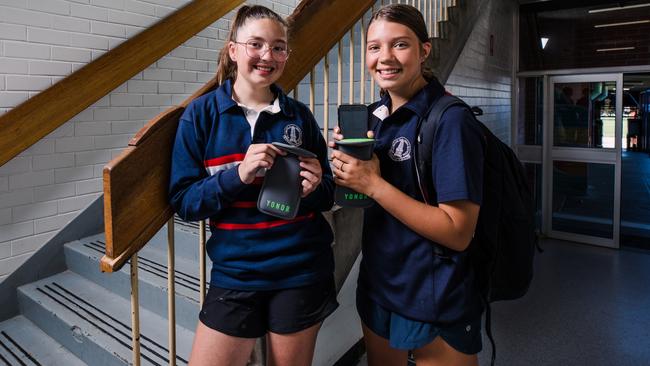Mobile phones in SA schools: Do we ban them, restrict them or encourage their use?
A hundred SA high schools are restricting phones. But an MP wants to trial a full ban, and other schools encourage use. Is there a right answer? Take the poll.
Education
Don't miss out on the headlines from Education. Followed categories will be added to My News.
More than 100 secondary schools in South Australia are applying restrictions to students’ use of mobile phones.
Students at primary level are banned from using phones during school hours but secondary schools each set their own rules under a policy introduced in December last year.
These vary from 100 per cent bans at schools such as Port Lincoln to integrating mobiles into the classroom at schools such as Glenunga International High.
SA Best MLC Connie Bonaros has introduced a Bill to parliament requiring 20 schools to trial bans.
“Mobile phones can be used in schools, predominantly secondary schools, as insidious tools for harassment and bullying,” Ms Bonaros told parliament.
The trial would require students to put their phones in pouches which are locked on arrival and unlocked on departure but kept in the possession of the student.
Education Minister John Gardner said the Bill was redundant as schools were already trialling pouches or other systems.
“Some have restricted mobile phones from all students or from some students in certain year levels, or at certain times of the day as they have found best meets the needs of their school,” he said.
Opposition education spokesman Blair Boyer said the ALP was yet to be briefed on the Bill but in 2019 had called for a trial to balance the benefits and negatives. That policy said “Learning to put the phone away is an important lesson.”
Port Lincoln High uses lockable pouches which apply to all students all day, principal Todd George said.

“The school’s operating very differently without the devices,” he said.
“The way people interact at breaktime now is lovely – there’s a lot more interaction and physical activity, even down to backyard cricket being played on the oval again.”
Mr George said the school opted for the ban on three grounds:
– While phones could be useful, students must be capable of research without them;
– They were a distraction;
– They could be used for bullying.

At John Pirie Secondary, a graduated system applies, principal Roger Nottage said.
Years 7-9 must use the pouches and turn off the phone, including any hotspot capability.
Years 10-11 don’t use the pouches but can only use phones at break times.
Year 12s can be authorised by the teacher to use a phone for learning.
“It’s been very positive,” he said.
The pouches are supplied under a contract with US company Yondr.
John Pirie pays about $5000 a year to Yondr, covering 400 pouches, replacements for normal wear and tear and presentations by Yondr on phone etiquette and safety.
Students must pay $20 to replace vandalised pouches or to own a pouch which they can personalise.
Meningie Area School principal John Sutton said the school trialled pouches last year but abandoned them in favour of teaching students “proper use” of mobiles.
Now, bans apply up to Year 7, with Years 8-10 allowed use before and after school and Years 11 and 12 integrating them in lessons.
At Glenunga International students actively use phones in lessons, principal Wendy Johnson said.
“We believe in coaching students about self-regulation,” she said.
Under protocols developed by the students, phones are kept out of sight unless permitted by a teacher.
They can then be used for research or, with the teacher’s agreement, to record a lesson or conversation or photograph a whiteboard – allowing a student to concentrate on what’s being said rather than in taking notes.
Ms Johnson said applying the policy to all year levels ensured students developed good habits early.
SA Secondary Principals Association chief executive Peter Mader backed school councils making the rules rather than a statewide regimen.
Australian Education Union SA president Lara Golding supported a more formal trial of pouches if it was voluntary for schools and fully funded in addition to the normal budget.
“Initial feedback from members working in schools that are currently using a phone pouch system has been positive and we predict that there would be sufficient interest in a funded trial,” she said.




